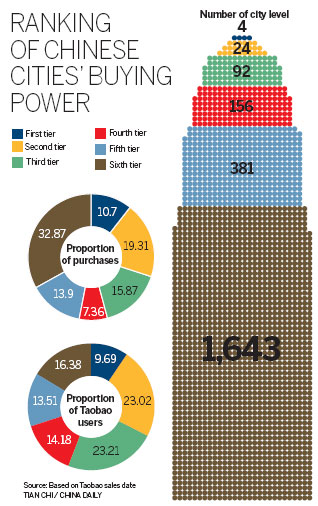Online-sales portal evaluates Chinese cities on buying power
Updated: 2012-07-19 08:06
By Zheng Jinran (China Daily)
|
||||||||

The country's largest online-shopping platform has placed about 2,600 cities among six levels based on their economic strength and online purchasing power.
The four Chinese cities with the highest GDP - Shanghai, Beijing, Guangzhou and Shenzhen - are the four in the first tier in the list because their economies are conducive to online shopping, according to a report released on Tuesday by Taobao, a domestic online-shopping service provider.
Most of the 24 second-tier cities are from the eastern and central areas and have higher incomes, convenient transportation, and easier access to the Internet. Only three western cities - Chongqing, Xi'an, and Chengdu - were on the second-tier list.
The cities' economies, populations, incomes and online purchases were evaluated in the research, which took two months.
"Among those topics, the most important one for the ranking is the proportion of Taobao users," said Zhang Pengfei, an analyst from Alibaba Group, one of China's biggest e-commerce company, which owns Taobao.
"That proportion can be influenced by the population and access to the Internet, which puts the developed eastern and central areas in a strong position."
In first-tier cities, more than 40 percent of residents had bought items from the website in 2011, and 30 percent of those in second-tier cities had done so, Taobao said.
"It's different from the city levels ranked by the governments, which take political power into consideration as well," Zhang said of the rankings, adding that people usually don't possess a clear understanding of their own city's ranking.
"Residents can use our list as a reference because our classification method includes some factors such as the economy, the same as governments do," he said.
Online shopping has witnessed a rapid increase both in sales and users in recent years. The annual monthly expense on Taobao per family reached 3,450 yuan ($540) in the first half of 2011, an increase of 13 percent year-on-year. And people between the age of 25 and 45 are the main users.
"Since the proportion of online-shopping lovers is larger in first- and second-tier cities, the rapid increase may be possible in other remote areas, especially fourth- or fifth-tier cities," said Chen Shousong, an analyst from Analysys International, based in Beijing.
The cities labeled in the sixth tier saw the largest increase of users in the first six month this year, 151 percent higher, the Taobao report said.
Chen said other online-shopping trends will eventually appear. For examples, items such as fresh vegetables that are ruined by long-distance shipping will become available, thanks to improving transportation, Chen said. In addition, more old people will be among online shoppers in the coming years, Chen said.
In fact, sales and numbers of senior users have increased by 200 percent since 2009.
"But the young group is still the main contributor," Chen said.
zhengjinran@chinadaily.com.cn
(China Daily 07/19/2012 page7)

 Relief reaches isolated village
Relief reaches isolated village
 Rainfall poses new threats to quake-hit region
Rainfall poses new threats to quake-hit region
 Funerals begin for Boston bombing victims
Funerals begin for Boston bombing victims
 Quake takeaway from China's Air Force
Quake takeaway from China's Air Force
 Obama celebrates young inventors at science fair
Obama celebrates young inventors at science fair
 Earth Day marked around the world
Earth Day marked around the world
 Volunteer team helping students find sense of normalcy
Volunteer team helping students find sense of normalcy
 Ethnic groups quick to join rescue efforts
Ethnic groups quick to join rescue efforts
Most Viewed
Editor's Picks

|

|

|

|

|

|
Today's Top News
Health new priority for quake zone
Xi meets US top military officer
Japan's boats driven out of Diaoyu
China mulls online shopping legislation
Bird flu death toll rises to 22
Putin appoints new ambassador to China
Japanese ships blocked from Diaoyu Islands
Inspired by Guan, more Chinese pick up golf
US Weekly

|

|






